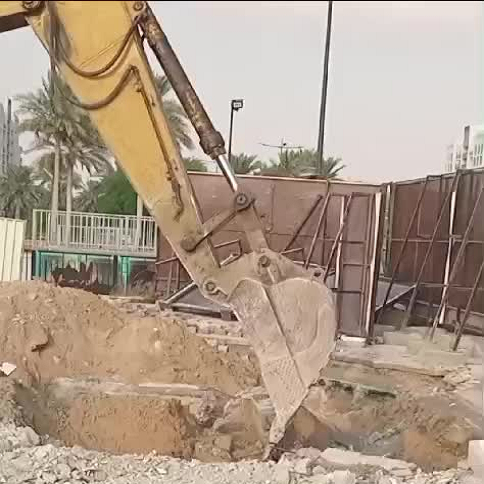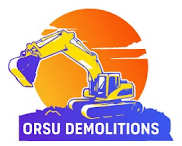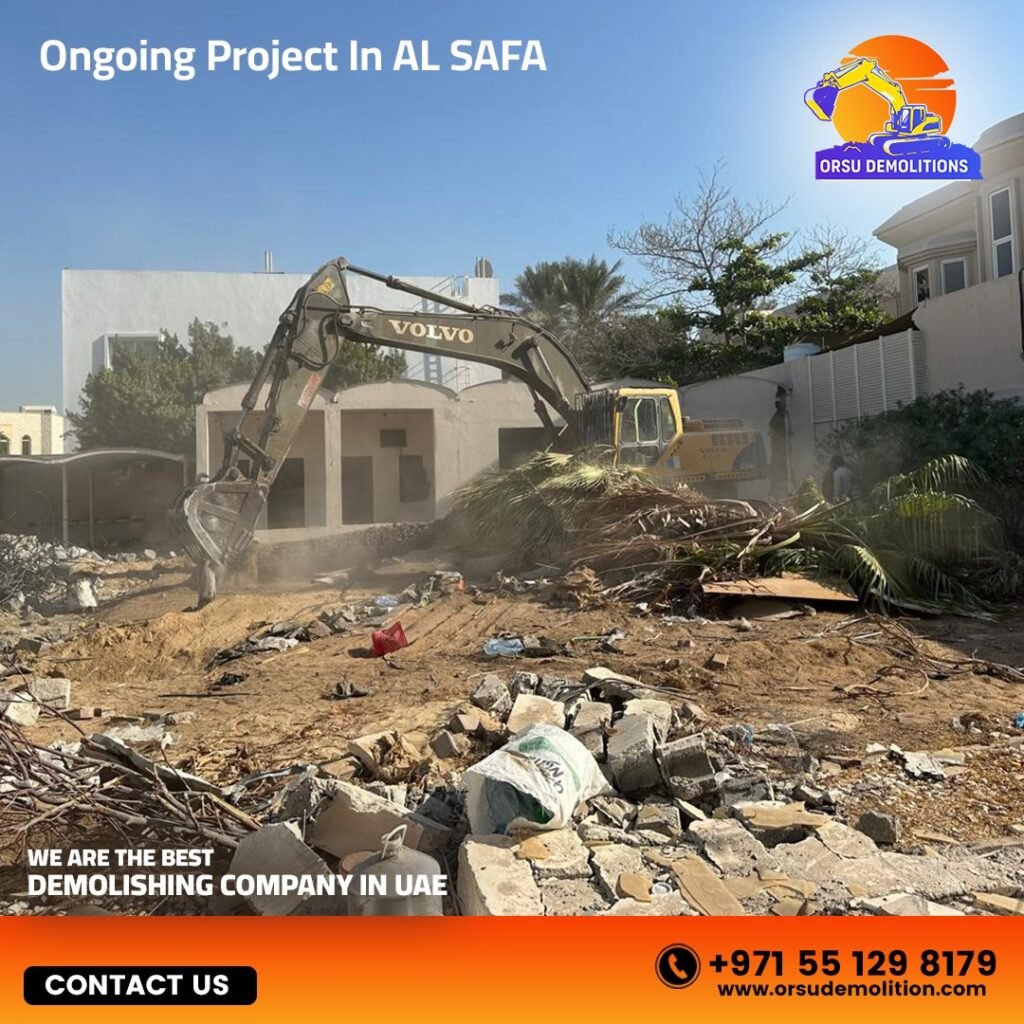ORSU Demolition: One of the Best Demolition Companies Dubai-Demolition Project in Al Quadra

ORSU Demolition Company is thrilled to announce the progression of our latest project Demolition Project in Al Quadra – the complete demolition of a large, multi-story structure in Al Quadra. This Demolition Project in Al Quadra highlights our company’s dedication to excellence, precision, and the highest standards of safety in the demolition industry. Our team is utilizing cutting-edge technologies, extensive planning, and sustainable practices to dismantle this structure with minimal environmental impact while meeting the unique demands of the site and the surrounding community.
Project Objectives and Scope
Demolition Project in Al Quadra involves the safe and efficient dismantling of a significant commercial structure. As with all ORSU projects, our focus is on delivering a successful demolition that prioritizes safety, compliance, and minimal disruption to nearby properties. Some primary objectives include:
Safely dismantling the structure with advanced demolition equipment
Implementing sustainable practices by salvaging and recycling materials
Minimizing noise, dust, and vibrations to ensure minimal impact on the local environment and community
Adhering to Dubai’s strict demolition regulations
Advanced Technology and Techniques
To ensure a safe and precise demolition process, ORSU is deploying some of the most advanced technologies in the industry. For the Demolition Project in Al Quadra our team is utilizing:
High-reach excavators for effective dismantling of tall structural elements, providing controlled and accurate demolition.
Robotic demolition tools in confined and hazardous spaces, allowing for safe operations without putting workers at risk.
Hydraulic crushers and pulverizers for breaking down concrete, steel, and other building materials efficiently.
Dust suppression systems to control airborne particles, maintaining air quality around the site.
These technologies help us maintain control over the demolition, avoid unnecessary structural damage to adjacent buildings, and prioritize safety at every stage.
Sustainability and Environmental Responsibility
Sustainability is at the heart of our approach for the Demolition Project in Al Quadra. ORSU is committed to recycling and salvaging materials wherever possible to reduce waste. Key sustainable practices include:
Material recycling: Concrete, steel, and glass are separated and sent for recycling, reducing landfill waste.
Selective demolition: We are selectively dismantling parts of the structure to preserve reusable materials and reduce energy usage in future manufacturing.
Safe waste management: ORSU ensures that non-recyclable materials and any hazardous substances are disposed of according to Dubai’s environmental guidelines.
By prioritizing recycling and responsible waste disposal, we are minimizing the environmental impact of the Demolition Project in Al Quadra and contributing to Dubai’s sustainability goals.
Demolition Project in Al Quadra: ORSU Demolition Company’s Latest Milestone
Safety and Compliance
Safety is our top priority on every project, especially in a large-scale Demolition Project in Al Quadra. ORSU has implemented a range of safety protocols to protect workers, the public, and the surrounding area. Key safety measures include:
- Real-time monitoring of noise, vibration, and dust levels to stay within acceptable limits and prevent community disruption
- Comprehensive worker safety protocols including personal protective equipment (PPE), wearable safety tech, and regular safety inspections.
- Hazardous material management Any asbestos, lead-based paints, or other hazardous substances are carefully removed and handled according to stringent safety regulations.
Community-Focused Approach
Demolition Project in Al Quadra is located in a busy area, meaning it’s essential to manage our work in a way that respects the needs of the community. ORSU has taken several steps to minimize disruption to the daily lives of residents, businesses, and passersby. Measures include:
- Noise and vibration control: We use noise-dampening equipment and limit the use of high-impact machinery during peak hours.
-
Traffic and access management: ORSU coordinates closely with local authorities to ensure that our project does not disrupt traffic flow or pedestrian access around the site.
-
Regular updates: We keep the local community informed about the project’s progress, upcoming activities, and any temporary disruptions they might experience.
Demolition projects in Dubai are subject to strict regulations. ORSU ensures full compliance with all relevant laws, including:
- Obtaining necessary permits and approvals before initiating demolition activities.
- Following environmental regulations on dust control, waste disposal, and noise management.
- Adhering to health and safety standards to protect workers and the public.
By following regulatory guidelines, ORSU maintains transparency and accountability, delivering a project that aligns with Dubai’s high standards for construction and demolition.
In conclusion, the Demolition Project in Al Quadra serves as a powerful example of ORSU Demolition Company’s expertise, dedication to safety, and commitment to environmental responsibility. Through the careful application of advanced technology, stringent safety protocols, sustainable waste management practices, and community-focused engagement, ORSU has demonstrated a model approach to modern demolition projects. This project not only underscores ORSU's ability to manage complex demolition tasks efficiently but also highlights its alignment with Dubai’s urban development standards and environmental goals. The Al Quadra project sets a benchmark in responsible demolition, ensuring minimal disruption to the surrounding community while meeting high safety and quality standards. As ORSU completes this project, it reinforces its reputation as a leader in the demolition industry, paving the way for more sustainable and innovative projects in the future.
Why choose ORSU among demolition companies in Dubai?
ORSU is recognized for its safe, efficient, and environmentally responsible demolition practices. With advanced equipment and skilled teams, ORSU ensures projects are completed on time and within budget.
- Noise and vibration control: We use noise-dampening equipment and limit the use of high-impact machinery during peak hours.
- Traffic and access management: ORSU coordinates closely with local authorities to ensure that our project does not disrupt traffic flow or pedestrian access around the site.
- Regular updates: We keep the local community informed about the project’s progress, upcoming activities, and any temporary disruptions they might experience.
- Obtaining necessary permits and approvals before initiating demolition activities.
- Following environmental regulations on dust control, waste disposal, and noise management.
- Adhering to health and safety standards to protect workers and the public. By following regulatory guidelines, ORSU maintains transparency and accountability, delivering a project that aligns with Dubai’s high standards for construction and demolition.
In conclusion, the Demolition Project in Al Quadra serves as a powerful example of ORSU Demolition Company’s expertise, dedication to safety, and commitment to environmental responsibility. Through the careful application of advanced technology, stringent safety protocols, sustainable waste management practices, and community-focused engagement, ORSU has demonstrated a model approach to modern demolition projects. This project not only underscores ORSU's ability to manage complex demolition tasks efficiently but also highlights its alignment with Dubai’s urban development standards and environmental goals. The Al Quadra project sets a benchmark in responsible demolition, ensuring minimal disruption to the surrounding community while meeting high safety and quality standards. As ORSU completes this project, it reinforces its reputation as a leader in the demolition industry, paving the way for more sustainable and innovative projects in the future.
Why choose ORSU among demolition companies in Dubai?
ORSU is recognized for its safe, efficient, and environmentally responsible demolition practices. With advanced equipment and skilled teams, ORSU ensures projects are completed on time and within budget.




